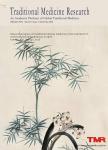Molecular mechanism prediction analysis of compound Kushen injection in the treatment of COVID-19 based on network pharmacology and molecular docking
作者机构:College of Chinese MedicineHebei UniversityBaoding 071000China
出 版 物:《Traditional Medicine Research》 (TMR传统医学研究)
年 卷 期:2020年第5卷第5期
页 面:413-424页
学科分类:1002[医学-临床医学] 08[工学] 0812[工学-计算机科学与技术(可授工学、理学学位)]
基 金:Natural Science Foundation of Hebei Province(H2018201179) Youth Fund of Education Department of Hebei Province(QN2019146) Scientific Research Fund of Health Department of Hebei Province(NO:20190948)
主 题:Compound Kushen injection Novel coronavirus Molecular docking Mechanism of action Severe acute respiratory syndrome coronavirus 23CL hydrolase Angiotensin-converting enzyme 2
摘 要:Background:As one of the eight effective traditional Chinese medicines for the treatment of atypical pneumonia,compound Kushen injection(CKI)played an important role in combating pneumonia caused by severe acute respiratory syndrome coronavirus 2 virus in China in *** is known to inhibit inflammation,and its main chemical components,namely matrine and oxymatrine,can promote Th cells to recognize and eliminate *** this study,network pharmacology and molecular docking were used to explore the mechanisms of CKI for treating coronavirus disease ***:The Traditional Chinese Medicine Systems Pharmacology Database and Analysis Platform and other related literature were used to screen CKI’s active ingredients in the *** Chinese Medicine Systems Pharmacology Database and Analysis Platform,Swiss Target Prediction and STITCH were used to search for potential targets of the active ***“ingredient-targetnetwork was constructed using the Cytoscape *** STRING online database was used to construct a target protein-protein interaction network that can be visualized and analyzed using the Cytoscape software to obtain key ***:Sophocarpine,sophoridine,matrine,(+)-allomatrine,AIDS211310,and sophranol were the six active *** docking the active ingredients with severe acute respiratory syndrome coronavirus 23CL hydrolase and angiotensin-converting enzyme 2(ACE2),they displayed suitable affinity,which could block viral replication and its binding to *** key targets mainly involved inflammatory factors,such as interleukin-6(IL-6)and tumor necrosis factor(TNF).Gene Ontology enrichment analysis mainly indicated the IL-6 cytokine-mediated signaling pathway and cytokine-mediated signaling *** Kyoto Encyclopedia of Genes and Genome pathway enrichment analysis mainly indicated steroid hormone biosynthesis and the TNF signaling ***:The alkaloids in CKI can block viral replication and its bi



